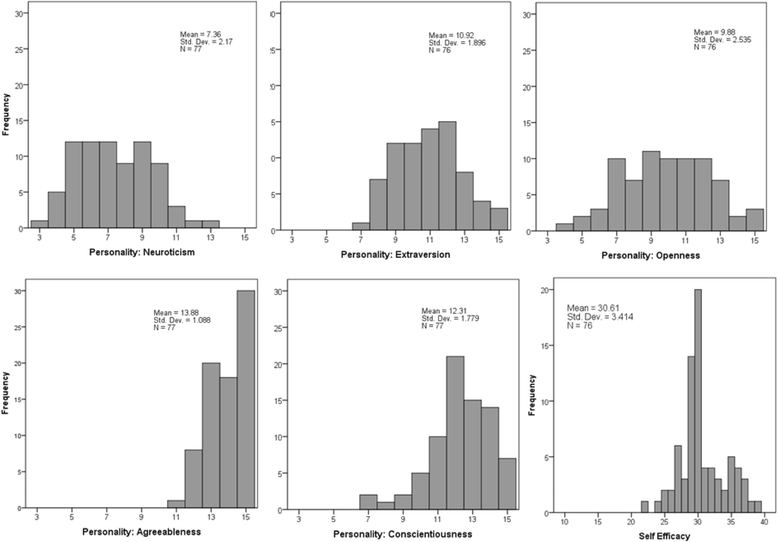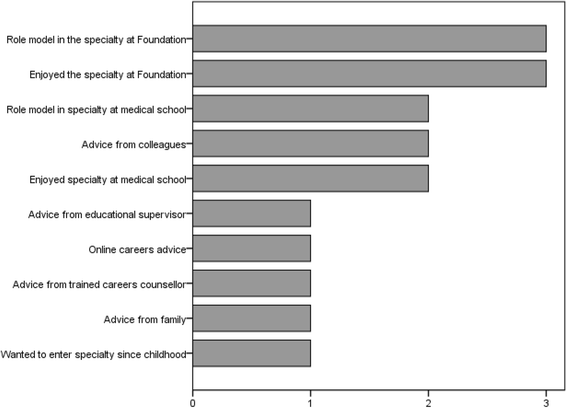The specialty choices of graduates from Brighton and Sussex Medical School: a longitudinal cohort study
- PMID: 25889968
- PMCID: PMC4365809
- DOI: 10.1186/s12909-015-0328-z
The specialty choices of graduates from Brighton and Sussex Medical School: a longitudinal cohort study
Abstract
Background: Since 2007 junior doctors in the UK have had to make major career decisions at a point when previously many had not yet chosen a specialty. This study examined when doctors in this new system make specialty choices, which factors influence choices, and whether doctors who choose a specialty they were interested in at medical school are more confident in their choice than those doctors whose interests change post-graduation.
Methods: Two cohorts of students in their penultimate year at one medical school (n = 227/239) were asked which specialty interested them as a career. Two years later, 210/227 were sent a questionnaire measuring actual specialty chosen, confidence, influence of perceptions of the specialty and experiences on choice, satisfaction with medicine, personality, self-efficacy, and demographics. Medical school and post-graduation choices in the same category were deemed 'stable'. Predictors of stability, and of not having chosen a specialty, were calculated using bootstrapped logistic regression. Differences between specialties on questionnaire factors were analysed.
Results: 50% responded (n = 105/277; 44% of the 239 Year 4 students). 65% specialty choices were 'stable'. Factors univariately associated with stability were specialty chosen, having enjoyed the specialty at medical school or since starting work, having first considered the specialty earlier. A regression found doctors who chose psychiatry were more likely to have changed choice than those who chose general practice. Confidence in the choice was not associated with stability. Those who chose general practice valued lifestyle factors. A psychiatry choice was associated with needing a job and using one's intellect to help others. The decision to choose surgical training tended to be made early. Not having applied for specialty training was associated with being lower on agreeableness and conscientiousness.
Conclusion: Medical school experiences are important in specialty choice but experiences post-graduation remain significant, particularly in some specialties (psychiatry in our sample). Career guidance is important at medical school and should be continued post-graduation, with senior clinicians supported in advising juniors. Careers advice in the first year post-graduation may be particularly important, especially for specialties which have difficulty recruiting or are poorly represented at medical school.
Figures
Similar articles
-
Career specialty choices of UK medical graduates of 2015 compared with earlier cohorts: questionnaire surveys.Postgrad Med J. 2018 Apr;94(1110):191-197. doi: 10.1136/postgradmedj-2017-135309. Epub 2018 Feb 12. Postgrad Med J. 2018. PMID: 29440478 Free PMC article.
-
Swiss residents' speciality choices--impact of gender, personality traits, career motivation and life goals.BMC Health Serv Res. 2006 Oct 23;6:137. doi: 10.1186/1472-6963-6-137. BMC Health Serv Res. 2006. PMID: 17054803 Free PMC article.
-
Career choices of the United Kingdom medical graduates of 2005, 2008 and 2009: questionnaire surveys.Med Teach. 2013 May;35(5):365-75. doi: 10.3109/0142159X.2012.746450. Epub 2013 Jan 29. Med Teach. 2013. PMID: 23360485
-
The impact of gendered experiences on female medical students' specialty choice: A systematic review.Am J Surg. 2023 Jan;225(1):33-39. doi: 10.1016/j.amjsurg.2022.10.023. Epub 2022 Nov 19. Am J Surg. 2023. PMID: 36435655
-
House officers' specialist career choices and motivators for their choice- a sequential mixed-methods study from Malaysia.BMC Med Educ. 2022 Nov 16;22(1):796. doi: 10.1186/s12909-022-03845-2. BMC Med Educ. 2022. PMID: 36384571 Free PMC article. Review.
Cited by
-
The Significance of Experiencing Clinical Responsibilities for Specialty Career Choice.Med Sci Educ. 2019 Oct 28;30(1):163-171. doi: 10.1007/s40670-019-00832-z. eCollection 2020 Mar. Med Sci Educ. 2019. PMID: 34457655 Free PMC article.
-
Influencing nursing students' perceptions of community care with curriculum-redesign; a quasi-experimental cohort study.BMC Med Educ. 2019 Aug 5;19(1):299. doi: 10.1186/s12909-019-1733-5. BMC Med Educ. 2019. PMID: 31382949 Free PMC article.
-
Exploring medical students' perceptions of the challenges and benefits of volunteering in the intensive care unit during the COVID-19 pandemic: a qualitative study.BMJ Open. 2021 Dec 24;11(12):e055001. doi: 10.1136/bmjopen-2021-055001. BMJ Open. 2021. PMID: 34952884 Free PMC article.
-
Specialty preferences and influencing factors: a repeated cross-sectional survey of first- to sixth-year medical students in Jena, Germany.BMC Med Educ. 2018 May 9;18(1):103. doi: 10.1186/s12909-018-1200-8. BMC Med Educ. 2018. PMID: 29743057 Free PMC article.
-
Factors affecting the choice of medical specialties in Turkiye: an analysis based on cross-sectional survey of medical graduates.BMC Med Educ. 2024 Apr 4;24(1):373. doi: 10.1186/s12909-024-05349-7. BMC Med Educ. 2024. PMID: 38576032 Free PMC article.
References
-
- Tooke J. Aspiring to Excellence. Findings and Recommendations of The Independent Enquiry Into Modernising Medical Careers. 2008.
MeSH terms
LinkOut - more resources
Full Text Sources
Other Literature Sources



